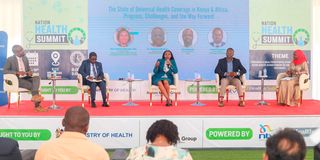Can digital health and AI close Kenya’s healthcare gaps? Experts say the future is now, but so are the risks

From left: Kenya Medical Practitioners, Pharmacists and Dentists Union (KMPDU) Secretary-General Davji Atellah, Kenya Union of Clinical Officers (Kuco) National Chairman Peterson Wachira and Global Association of Clinical Officers and Physician Associates President Austin Oduor Otieno during a panel discussion at the Health Summit event held at Kenyatta International Conference Centre (KICC) in Nairobi on April 16, 2025.
As Kenya grapples with a critical shortage of healthcare professionals, experts are pointing to digital health and artificial intelligence (AI) as key solutions to bridging the gap.
Speaking during the Third Nation Health Summit, organised by Nation Media Group, under the theme “Towards a Healthier Population: Innovating to Accelerate Achievement of Universal Health Coverage (UHC)”, a diverse panel of experts from the government, academia, health regulation, and the private sector, held a discussion to explore whether digital platforms and AI could be the catalyst that finally delivers equitable, accessible healthcare for every Kenyan.
While panelists agreed that integrating digital health and AI offers a timely and strategic solution to persistent inequities in Kenya’s healthcare system, their optimism was balanced by a sober recognition of the challenges ahead—namely infrastructure gaps, regulatory hurdles, ethical concerns, and the need for inclusive implementation.
Dr Esther Moloyce, Senior ICT Officer for Partnerships and Liaison at the State Department of ICT and Digital Economy, explained that Kenya’s investment in Faiba optic cables, which now stretch across all counties, is powering the connection of Level 4 and Level 5 hospitals under the National Optic Fibre Backbone Infrastructure (NOFBI). The ultimate goal, she said, is "last mile connectivity"—reaching homes and even wards in rural areas.
“Imagine a Kenya where, when you get sick, all you need is to log in online, speak to a doctor, get a prescription, and have the medicine delivered to your door,” she envisioned.

Panelists during a discussion at the Health Summit event held at KICC in Nairobi on April 15, 2025. The summit brought together healthcare professionals, policymakers, and industry leaders to discuss critical issues in public health and explore innovative solutions for improving health outcomes in the region.
But connectivity is only one piece of the puzzle.
Dr Moloyce stressed the need for a shift in mindset as well.
“We cannot afford to fear AI. We already lack enough doctors. AI isn’t taking jobs, but it’s helping where there are none.”
With Kenya’s doctor-to-patient ratio at 13 per 10,000, far below the WHO-recommended 23, she said, the urgency is evident.
Prof Sayed Karar, Acting Chief Medical Information Officer at Aga Khan University Medical College, East Africa, shared how the institution has embraced electronic health records (EHRs) since 2022, with the system now powering AI-enabled dashboards that give hospital leadership real-time insights.
“With a click of a button, we can see how many beds are occupied, who’s being readmitted within 72 hours, and even track sepsis trends across seasons,” he said.
“Before, we waited three days for Excel reports. Now, we make decisions in real time.”
This data not only streamlines operations, he said, but opens new avenues for predictive care—such as identifying at-risk patients earlier and optimising antibiotic response to sepsis, one of the world’s deadliest conditions.

From left: Amref Health Africa Country Director Meshack Ndirangu, Principal Secretary Public Health and Professional Standards Mary Muthoni and Nation Media Group Chief Corporate Affairs and Partnerships Officer Monicah Ndung’u cut a ribbon to officially open the Health Summit event held at Kenyatta International Conference Centre (KICC) in Nairobi on April 15, 2025.
Dr Mary Moussa, Head of Consulting at Africa Health Business, emphasised that AI is only one pillar in a broader digital health ecosystem—one that includes telemedicine, e-pharmacy, mobile diagnostics, and teleprescriptions.
“UHC means equity—regardless of who you are or where you live,” she said. “Telemedicine allows us to offer mental health services, preventive care, and chronic disease management, even in remote areas.”
Dr David Kariuki, CEO of the Kenya Medical Practitioners and Dentists Council, steered the conversation towards self-reliance and regulation.
“We need to stop looking to the Global North for benchmarks. We already have functional systems like the Kenya EMR in Murang’a County. Let them learn from us,” he said.
Legal groundwork
Kenya’s Digital Health Act (2023) and Data Protection Act (2019) are already laying the legal groundwork for responsible AI integration.
Dr Kariuki also revealed the development of a National Digital Health Information Exchange, which will allow seamless patient data sharing across the country.
“If a patient is treated in Mombasa today and travels to Kisumu tomorrow, the doctor there will be able to access their full medical history,” he explained.
But even as technology surges ahead, Dr Kariuki insisted that regulations must ensure data privacy, sentiments echoed by experts from across Africa who are urging caution.
In a previous interview with Prof Kathryn Chu, the director of the Center for Global Surgery at Stellenbosch University, South Africa, said that without strong data protection and ethical safeguards, “AI could do more harm than good. Patient trust is everything.”
She also warned that AI systems are only as good as the data they’re trained on. “Most models use Western data, which can misrepresent African realities.”
“Also, the digital divide also looms large. Many rural areas across Africa still lack the internet access or devices required to use these advanced tools, potentially worsening healthcare inequalities if deployment is not inclusive,” added Prof Chu.


